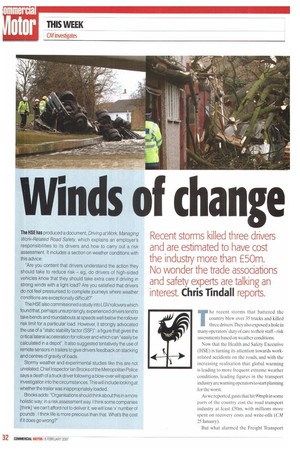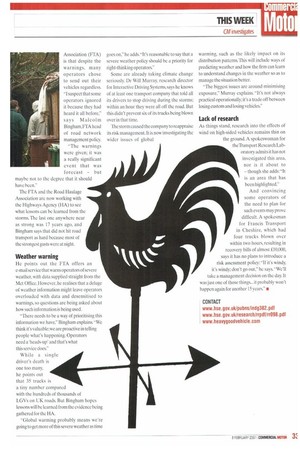Winds of change
Page 32

Page 33

If you've noticed an error in this article please click here to report it so we can fix it.
The HSE has produced a document, Driving at Work, Managing Work-Related Road Safety, which explains an employer's responsibilities to its drivers and how to carry out a risk assessment. It includes a section on weather conditions with this advice:
"Are you content that drivers understand the action they should take to reduce risk eg, do drivers of high-sided vehicles know that they should take extra care if driving in strong winds with a light load? Are you satisfied that drivers do not feel pressurised to complete journeys where weather conditions are exceptionally difficult?"
The HSE also commissioned a study into LGV rollovers which found that. perhaps unsurprisingly, experienced drivers tend to take bends and roundabouts at speeds well below the rollover risk limit for a particular load. However, it strongly advocated the use of a "static stability factor (SSF)": a figure that gives the critical lateral acceleration for rollover and which can "easily be calculated in a depot". It also suggested tentatively the use of remote sensors in trailers to give drivers feedback on stacking and centres of gravity of loads.
Stormy weather and experimental studies like this are not unrelated; Chief Inspector Ian Brooks of the Metropolitan Police says a death of a truck driver following a blow-over will spark an investigation into the circumstances. This will include looking at whether the trailer was inappropriately loaded.
Brooks adds: "Organisations should think about this in a more holistic way; in a risk assessment way. I think some companies [think] 'we can't afford not to deliver it. we will lose 'x' number of pounds'. I think life is more precious than that. What's the cost if it does go wrong?"
The recent storms that battered the country blew over 35 trucks and killed three drivers. They also exposed a hole in many operators' duty of care to their staff-risk assessments based on weather conditions.
Now that the Health and Safety Executive (HSE) is turning its attention towards workrelated accidents on the roads, and with the increasing realisation that global warming is leading to more frequent extreme weather conditions, leading figures in the transport industry are warning operators to start planning for the worst.
As we reported gusts that hit 99mph in some parts of the country cost the road transport industry at least f50m, with millions more spent on recovery costs and write-offs (CM 25 January).
But what alarmed the Freight Transport Association (FTA) is that despite the warnings, many operators chose to send out their vehicles regardless. "I suspect that some operators ignored it because they had heard it all before," says Malcolm Bingham,FEA head of road network management policy.
"The warnings were given; it was a really significant event that was forecast — but maybe not to the degree that it should have been."
The FTA and the Road Haulage Association are now working with the Highways Agency (HA) to see what lessons can be learned from the storms. The last one anywhere near as strong was 17 years ago, and Bingham says that did not hit road transport as hard because most of the strongest gusts were at night.
Weather warning
He points out the FTA offers an e-mail service that warns operators of severe weather, with data supplied straight from the Met Office. However, he realises that a deluge of weather information might leave operators overloaded with data and desensitised to warnings, so questions are being asked about how such information is being used.
"There needs to be a way of prioritising this information we have," Bingham explains. "We think it's valuable:we are proactive in telling people what's happening. Operators need a 'heads-up' and that's what this service does."
While a single driver's death is one too many, he points out that 35 trucks is a tiny number compared with the hundreds of thousands of LGVs on UK roads. But Bingham hopes lessons will be learned from the evidence being gathered for the HA.
"Global warming probably means were going to get more of this severe weather as time goes on," he adds. "It's reasonable to say that a severe weather policy should be a priority for right-thinking operators."
Some are already taking climate change seriously. Dr Will Murray, research director for Interactive Driving Systems, says he knows of at least one transport company that told all its drivers to stop driving during the storms; within an hour they were all off the road. But this didn't prevent six of its trucks being blown over in that time.
The storm caused the company to reappraise its risk management. It is now investigating the wider issues of global warming, such as the likely impact on its distribution patterns. This will include ways of predicting weather and how the firm can learn to understand changes in the weather so as to manage the situation better.
"The biggest issues are around minimising exposure," Murray explains. "It's not always practical operationally; it's a trade off between losing custom and losing vehicles."
Lack of research
As things stand, research into the effects of wind on high-sided vehicles remains thin on the ground. A spokeswoman for the Transport Research Laboratory admits it has not investigated this area. nor is it about to — though she adds: "It is an area that has been highlighted." And convincing some operators of the need to plan for such events may prove difficult. A spokesman for Francis Transport in Cheshire, which had four trucks blown over within two hours, resulting in recovery bills of almost £10,000, says it has no plans to introduce a risk assessment policy: "If it's windy, it's windy; don't go out," he says. "We'll take a management decision on the day. It was just one of those things... it probably won't happen again for another 15 years."


























































































































































































